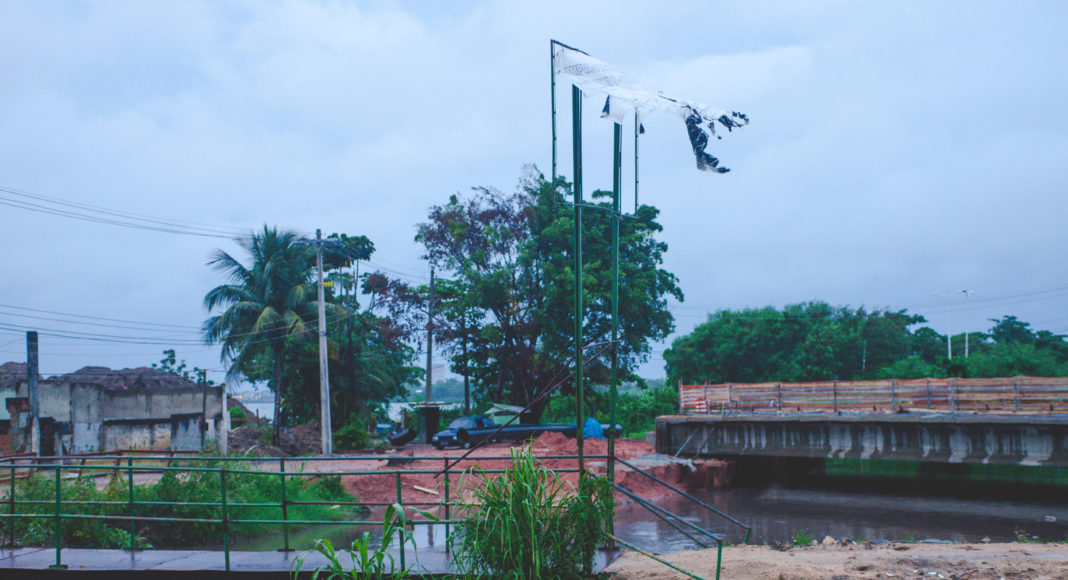Vila Autódromo, the small favela that got in the way of the mighty Olympics, has finally signed a deal with Rio city hall to urbanise the community in what is being hailed as a victory for the residents who refused to leave at any price.
If the office of Mayor Eduardo Paes fulfils its legal obligation to build new homes in the community for the families who have resisted bribery, threats, intimidation and the steady erosion of their quality of life in order to remain, could this even be a stop sign for the juggernaut of Olympic development?
The agreement announced last month comes after a violent struggle over the residents’ right to remain in the community in western Rio, which has been devastated as dozens of families were persuaded or forced to leave in the past couple of years and bulldozers were ordered in to raze their homes. The struggle intensified in mid-2015 as the city resorted to force to move on residents in the community alongside the Jacarepagua lagoon and next to the Olympic Park.
Walking around Vila Autódromo recently was a chilling experience. The 25 or so families who are left live among the dust and rubble of demolished homes; pools of fetid water and building material such as rusty iron rods have accumulated – a deliberate tactic, says resident Sandra Maria de Souza, explaining that construction firms failed to clear up in order to make conditions “inhuman”. In a sign of how the original community of around 600 families has been divided, some buildings are torn in two, with the homes of those who agreed to go peeled off the adjoining homes of those who did not.
Surely no one would still want to live here? Or, at least, that is what city hall was banking on. But De Souza, 44, who has been a leading figure in the resistance, reeled off some of the reasons for holding out: her children attend one of Rio’s best state schools; there are no militia or drug-trafficking gangs here; neighbours whose families have known each other for generations readily help each other out; it is safe for her daughters to walk home at night.
For the poorest families, it is extremely hard to find a place to live in such conditions anywhere in Rio, and city hall failed to concede that not only do low-income residents have rights to remain in the peaceful community they have created over decades but that their values might even be shared by a much wider audience who sympathise with and support their right to remain. With the help of academics, the residents drew up their own award-winning urbanisation plan, put on resistance events and received journalists from all over the world. Their message: “Not everyone has a price”.
Larissa Lacerda, an urban planning graduate and activist with the Popular Committee on the World Cup and the Olympics, believes the widening out of the resistance from the “usual activists’ to Brazilian celebrities and leading figures in the arts led city hall to conclude it had to agree to upgrade the community, which was settled by fishermen and construction workers in the 1960s and 70s, and has been fighting for housing security for the past 20 years.
As the favela became emblematic of the worldwide struggle against the erosion by market and state forces of a community’s right to an urban space, the city could hardly use force to evict the last residents in the full glare of the media spotlight. Vila Autódromo was now not just an an eyesore that needed to be cleaned up in time for the Games but a sore spot for the IOC whose reputation was being steadily dented by the struggle. Under the new plan, 25 houses will be built before the Olympics, with a new resident’s association housed in a “cultural centre”, and a sports pitch.
I asked Theresa Williamson, executive director of the NGO Catalytic Communities, about the wider significance of the community’s deal with the city. She said: “The significance of Vila Autódromo is what it teaches all of us – communities fighting top-down policies and mega-event development about the value of persistence, creative solutions and prolonged visibility; the IOC about the importance of taking its own claim about legacy seriously and actually seeking to produce a legacy.”
But she points out that many families who have agreed to go are still awaiting compensation, some feel they were misled over their rights and many regret agreeing to leave. Campaigners say that the notion that many who did leave went of their own free will is a myth; the community was punished by cuts to services like postal delivery and electricity, lied to and threatened and bullied with force. Their own preferred plan for urbanisation has not been followed.
If the promised homes assure permanence for the residents of Vila Autódromo, the new deal will be a victory not just for those who resisted but for the idea that poor communities cannot simply be displaced and forced to the margins of any city to make way for big business and property speculation. But this victory will have come at a very high price and will require all those who support it to remain vigilant – to ensure it turns into reality.
* Jo Griffin is a free-lance jounralist who has worked in Brazil and Mexico.
All photos in this artice were taken by Malachy McCrudden. Further examples of his work can be found on his website.
Previous article
Next article

